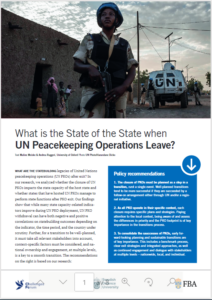RESEARCH BRIEF: What is the State of the State when UN Peacekeeping Operations Leave?
Recent research by Prof. Andrea Ruggeri and Dr. Maline Meiske shows that while many host state capacities may improve during UN PKO deployment, the positive state building outcomes often cannot be obtained after the closure of the operation.

The remarkable findings are based on recent empirical evidence and analysis. It indicates that host states are unable to achieve state building outcomes in pure material and economic terms, but also because they involve a potential risk of a decline of democracy and rule of law in these societies.
This is one of several research briefs, which is part of a joint initiative by the Folke Bernadotte Academy (FBA), the Challenges Forum International Secretariat (CFIS) and the Swedish Defence University (SEDU). The aim of the series is to contribute to policy development by bringing cutting-edge research on key issues within peacekeeping to the attention of policy makers and practitioners.
The views and opinions expressed in the brief series are those of the author(s) and do not necessarily reflect the official policy or position of the collaborating partners.
All six research briefs in the series are listed below:
Optimising_National_Staff_Contributions_in_UN_Peacekeeping_Operations
UN–AU_Collaboration_Ambitions_People-Centric_Operations
Mandate_Interpretation_Multinational_Collaboration_UN_mission_Mali
Local_Perceptions_of_Robust_PoC_UNMISS_AMISOM

